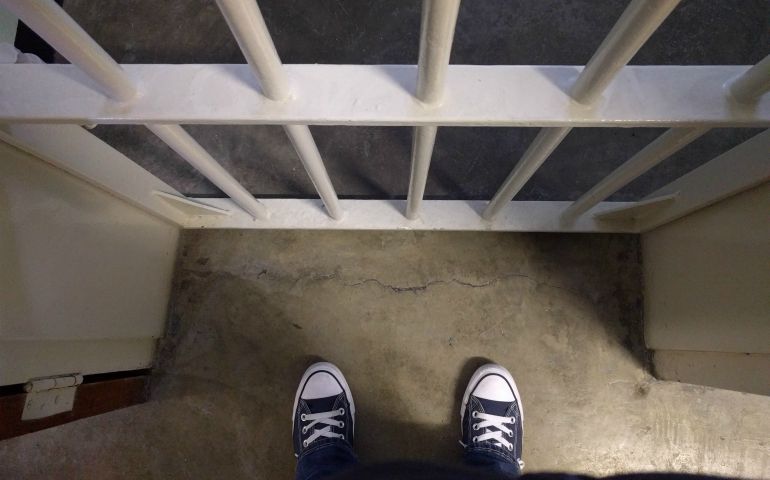
Joceyln Sideco's feet at the door of Nelson Mandela's former cell on Robben Island (Jocelyn Sideco)
Days after I visited Mr. Mandela's cell on Robben Island off the shores of Cape Town, South Africa, I woke up to a dream of my friends in a choir singing "Freedom is Coming."
Oh Freedom… Oh Freedom… Oh Freedom
Freedom is coming… Freedom is coming… Freedom is coming… oh, yes, I know
Oh mercy…
Oh justice…
When I went to Santa Clara University, I participated in the mission choir. We sang and led the music for the 10 p.m. Sunday student Mass. I played guitar my first two years until my irregular attendance pushed my director to invite me to reconsider my commitment. In all honesty, I didn't think my voice was strong enough to be in the choir, and the only thing that gave me distinction was that I could play (or pray, I would say) the guitar. But when another classmate came with better skills, I found myself too shy and too nervous to really be present in this ministry.
Then one day, I found myself in front of a pair of shiny, golden conga drums. I had never played congas before that day but I knew I had rhythm. In fact, I remember wanting to learn percussion from the early age of 4 when I would beg my parents for a drum set. They resisted, and I persisted to beat on tables with my hands and any utensil I can get my hands on. I remember watching one of my high school teachers beat on a djembe at Mass. I kept thinking to myself, "If you hit it with the base of your palm, that's a different sound. If you hit it with your finger tips on a different part of the drum head, that would be a different sound."
So that's what I did. I beat on these congas and found that I was a natural. My choir friends were surprised. "Are you sure you've never played congas before? That can't be right," they would say.
I prayed those congas each Sunday: opening song, responsorial psalm, Gospel acclamation, offertory song, memorial acclamation, Lamb of God, Communion song, meditation song, slosing song. You name it, I prayed it.
I knew that every time I beat on these drums, I was making concrete and in the flesh, God's heartbeat. I wanted to remind myself and others of God's presence in and through and around us all. And what God wanted for us was the presence of mind to be persistent amidst the chaos.
Praying the congas allowed me to have a voice, especially when I actually thought my voice was not as beautiful, smart or desirable to hear as others. The congas gave me an identity that was both unique and supportive of others.
Then my director was struggling to find a voice that could lead "Freedom is Coming." Everyone sang the notes well enough, but he insisted that we sounded rigid and rehearsed (which we were). He wanted to release soul with this song "This is a song of liberation. Just imagine yourself confined yet hopeful."
As I found my beat and led the charge with the timing and character of the piece, he said, "Jocelyn, it seems like you get a sense of what this song needs. Why don't you try the solo?"
"And give up my congas? No way!" I thought. "And anyway, so-and-so has a better voice."
"Just try it."
So I sang. A bit shy and weak at first, then my voice got under my feet, swayed me and the choir left to right as I closed my eyes. I felt amazing, like the Holy Spirit just came right through my vessel simply because I trusted enough to try.
I loved this song. I would sing it in the shower, on my way to classes, while I studied, when I was experiencing hardship. When we sang it during that student Sunday Mass, we felt it. We knew someday we would be experiencing freedom, mercy, justice as we prayed for the kin-dom of God to be at hand. All those injustices will be made right. All those who are oppressed will be freed. All those persecuted will be dignified.
I woke up with a deep smile on my face as I prayed with the thought that Nelson "Madiba" Mandela was and continues to be the voice of freedom, mercy and justice to the people of South Africa and to people around the world wanting God's kin-dom of peace and justice to reign.
Standing at his 8-by-6-foot cell, contemplating the bars of restraint he was surrounded by, I wondered what daily activity got him through to freedom. Madiba (his clan name often used as a term of endearment) found his voice with his peers. He also began to write his autobiography, A Long Walk to Freedom, from inside those gates. Icon of both the movement to defy and resist the inhumanity of Apartheid, Madiba gives us an example of how to gain our own voice and dignity while not trampling on others.
He knew "Freedom is coming." In fact, he worked for it each and every day. I hope I can, too.
For those of you who want to continue to be inspired, celebrate Mandela Day each July 18 (his birthday) by serving your neighbors for at least 67 minutes. The number refers to the years he was in the struggle.
[Jocelyn A. Sideco is a retreat leader, spiritual director and innovative minister who specializes in mission-centered ministry. She directs the Community Service and Social Justice office at St. Ignatius College Preparatory in San Francisco. Visit her online ecumenical ministry, In Good Company, at ingoodcompany.net.co or email her at jocelyn@ingoodcompany.net.co.]
Editor's note: Want more stories from Young Voices? Sign up here for the latest weekly column.




